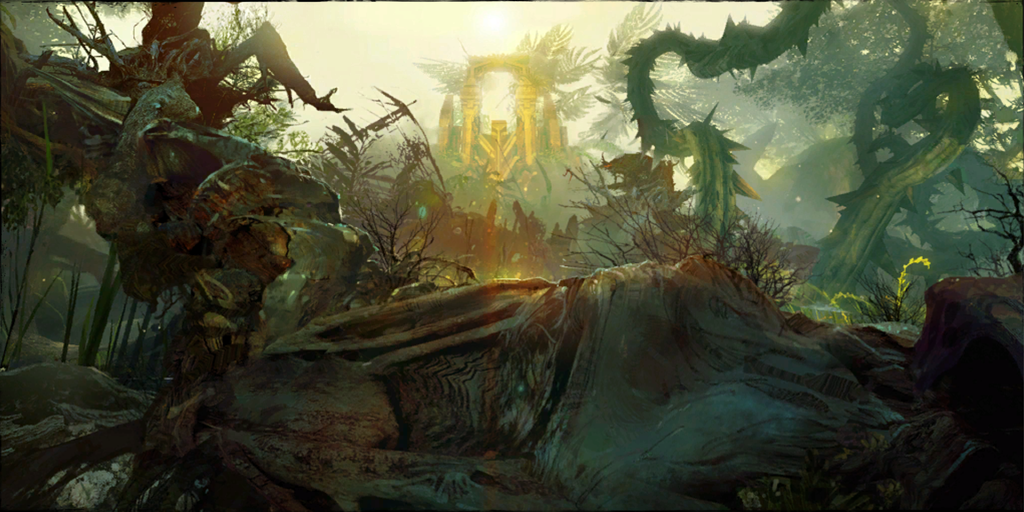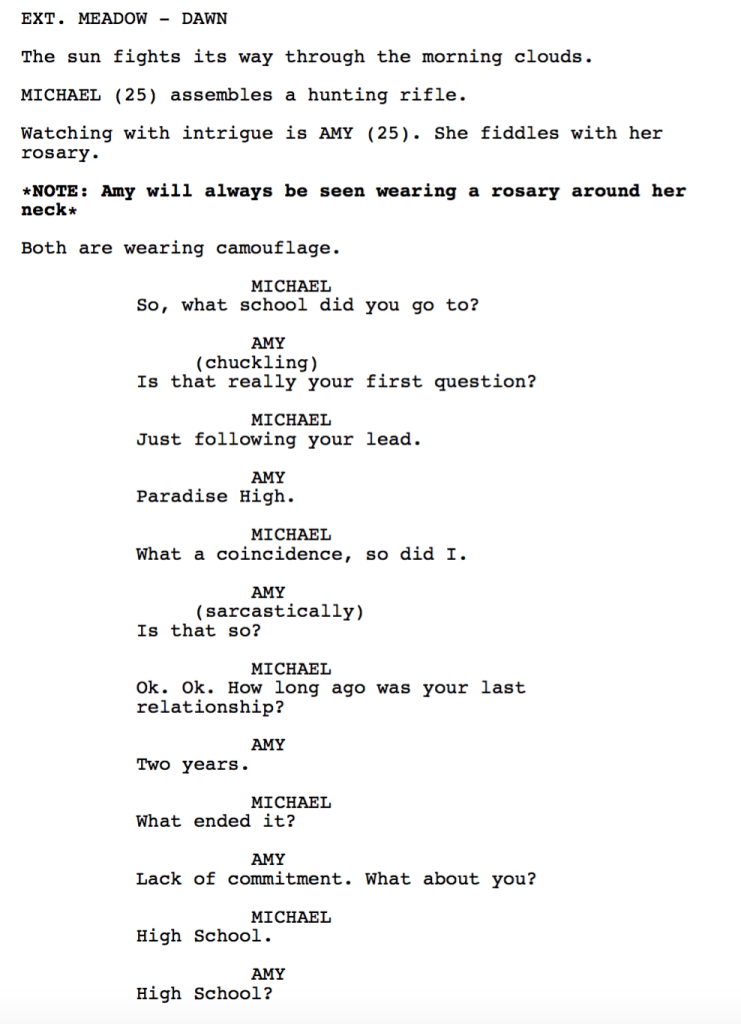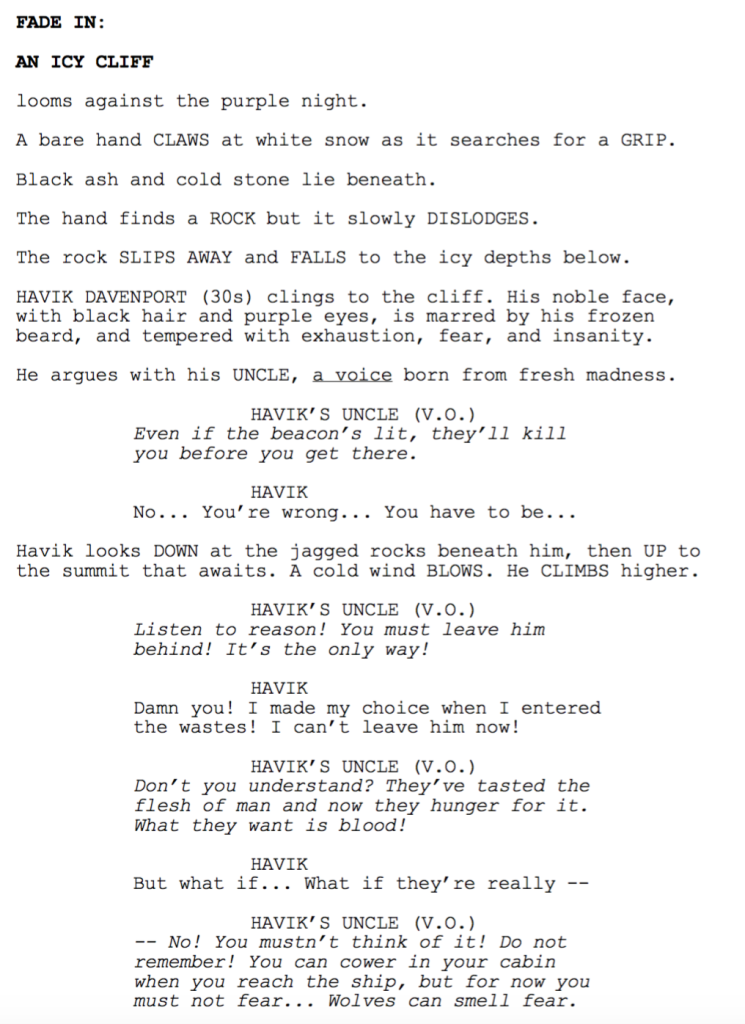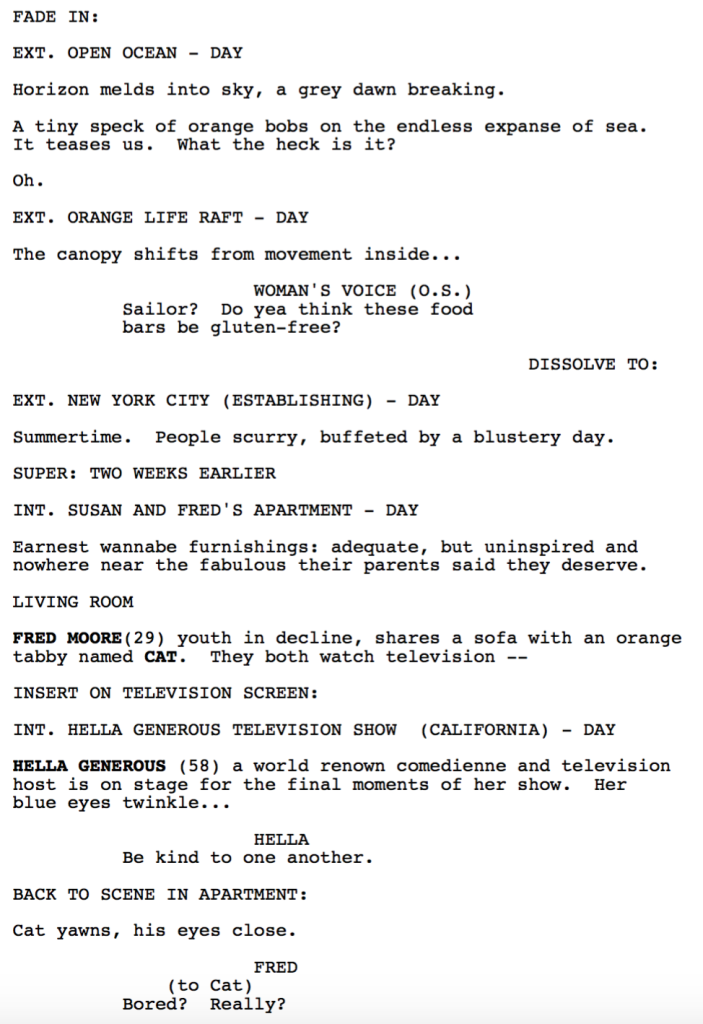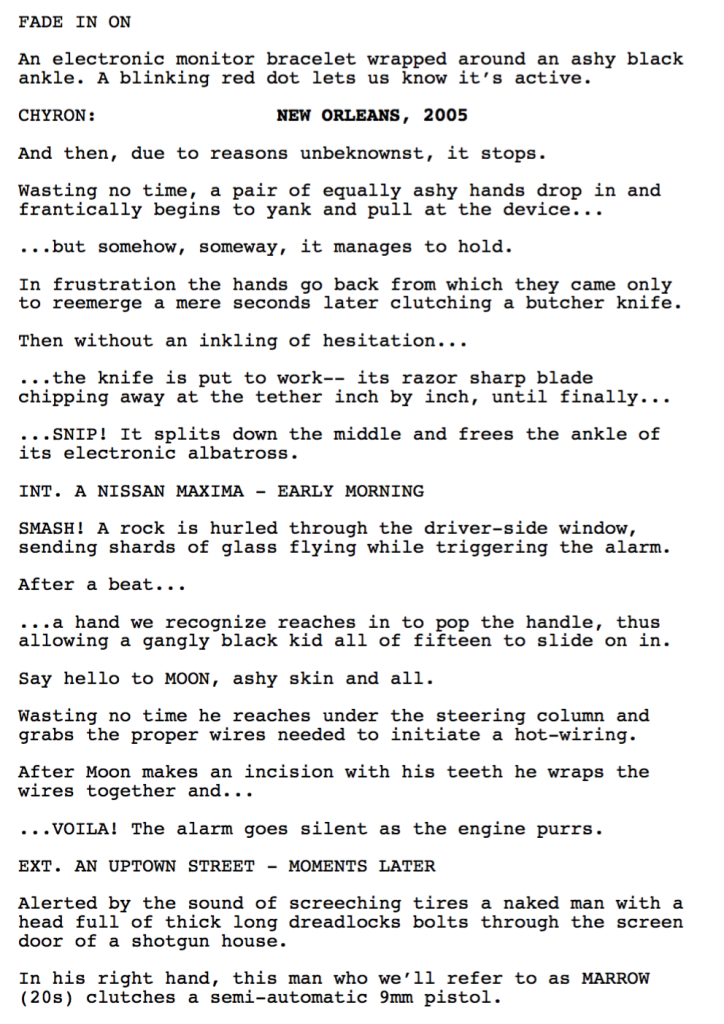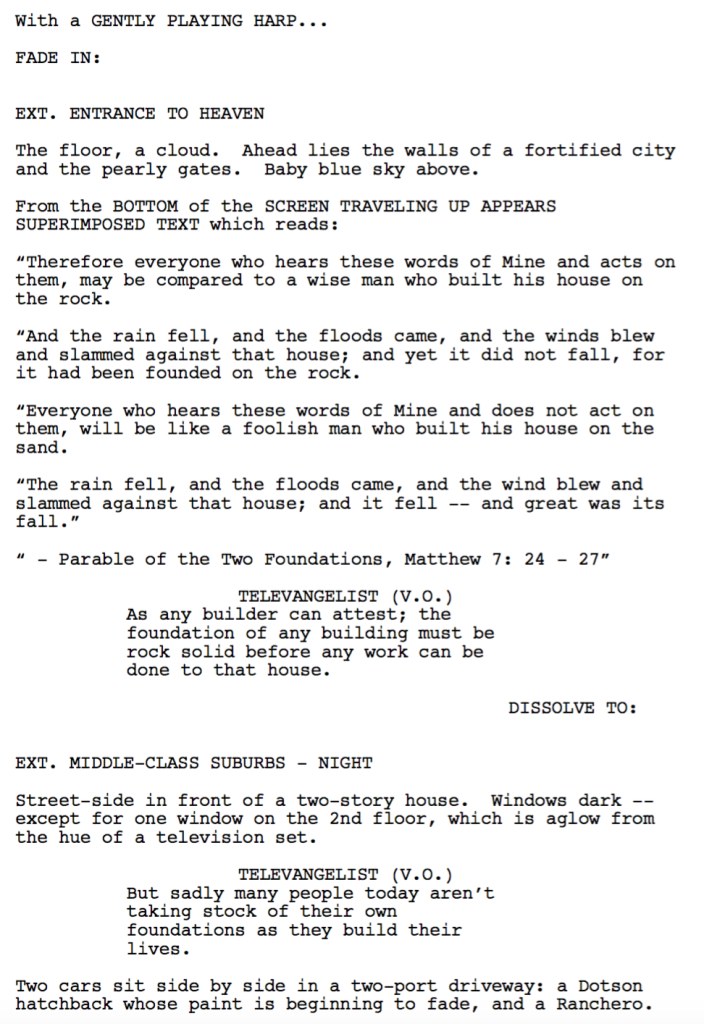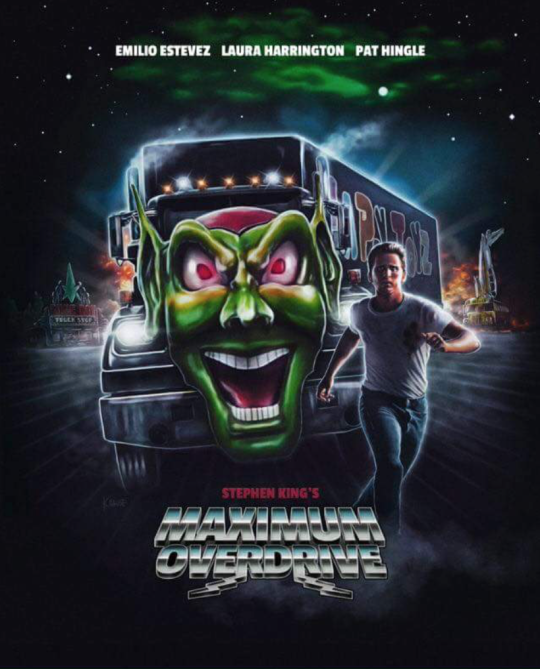Genre: Action/Adventure
Premise: The military contracts a disgraced Harvard professor who believes in dragons to escort them to a mysterious island where the mythical beasts potentially still exist.
About: What else is there to say? It’s another Max Landis script, baby. The one writer still making huge spec sales. This one, to my knowledge, has not sold yet. But if anyone has any updated information on that, let me know.
Writer: Max Landis
Details: 120 pages (Dec 2014 draft) Second Rewrite
Max Landis really likes orcs.
And dragons.
And fairies n stuff.
By the way, I finally figured out why the trailer for Landis’s Netflix flick, “Bright,” begins with that uncomfortable fairy-beating sequence. I realized that a meeting took place within the Netflix brain trust…
“How do we show that this is the kind of fantasy movie Hollywood can’t make?” So they had Will Smith beat the shit out of fairy, the message being: This ain’t your grandfather’s fantasy flick.
Was that choice a success? No.
But that’s what’s great about Netflix. They’re okay with taking chances. And chances often fail, as I’ve discussed in a recent Scriptshadow post.
So let’s get to today’s script, because I think there’s a huge screenwriting lesson we can learn from it. But before I tell you what that is, let’s dive bomb, dragon-style, into the plot…
Terra Obscura starts with one of the most traditional first acts you’ll find in a movie like this. Which was surprising since Landis is such an anarchist. Adam Burns just got fired from his Harvard professorial job after an interview of him saying he believes in dragons goes viral.
After his girlfriend reams him out for deep-sixing his career, Adam is kidnapped off the street by men who’ve watched too many movies, since they throw a bag over his head then yank him into a van. They then throw him on a helicopter, informing him that they’re going to an island where a Russian sub thats’s been programmed to launch a nuclear attack on the U.S. has crashed.
Adam makes it clear he doesn’t know why he’s here. “I don’t know what’s going on.”
“On the contrary,” the military official tells him. “You might be the only one who knows what’s going on.”
Cue our “HARD CUT TO” Predator helicopter moment. Oh yeah, this island they’re going to may contain… creatures of the magical type. That’s confirmed the second they fly over land when two dragons that would make Khallesi’s corset explode attack the Blackhawks.
Adam’s helicopter crashes and he and the men use a radiation meter to figure out where the marooned sub is. But on the way there, they run into orcs and fairies and Necromances and Dark Elves and other nerdy monsters. What Adam realizes is that the Russian sub may have been a ruse. Which means they’ve been lured here. But why? The answer may be much worse than a measly nuclear attack on the United States…
The first thing I noticed about Terra Obscura had nothing to do with Terra Obscura. Rather, it had to do with Skull Island and Ghostbusters. Strangely, two of the first three scenes in Landis’s script have helicopters arriving on an “invisible” island and giant monsters attacking them. After that, we flash back to show Adam getting fired from his job at a prestigious university because he yelled into a camera, “I believe in dragons,” then got fired by his boss after it went viral.
Both these scenes, almost verbatim, were in Skull Island and [the new] Ghostbusters. I see that this script pre-dates both of those films. So what does that mean? I remember Landis either worked on or was going to work on Ghostbusters. So maybe he wrote a similar scene there and they used it cause they had the rights? But I didn’t know Landis worked on Skull Island. And if he didn’t, does that mean someone just took this scene from Terra Obscura?
Of course, there’s a third possibility: None of us are as original as we think we are. Maybe these ideas are so obvious that everybody is writing versions of them. I don’t know. But I found that surprising. I was like, “I’ve seen both of these scenes already!”
There’s a bigger talking point I wanted to get into today, however. And it has to do with the fact that Bright got made and Terra Obscura (as of today) did not. Why is that?
BUDGET
Bright is set in the real world with actors wearing prosthetics. Terra Obscura is shooting in a jungle with a full slate of Lord of the Rings like creatures. In other words, it’s a lot more expensive.
I’m often asked by writers if they should write something big budget or small. The answer to this is more complicated than you’d think but I’ll give you the simple answer first. SMALL. Look at the data. How many non-IP giant-budgeted movies are made a year? Two? How many non-IP small budget movies are made a year? A LOT. So you’re increasing your number of buyers exponentially with a lower-budgeted script. Which is why Bright was kind of genius. It was a high-concept idea that was financially achievable.
However, there’s a growing belief that it’s so difficult to sell screenplays, you have to entertain the long game when thinking about which script to write. So if you want to write big-budget movies like James Bond, you write a James Bond-like movie, knowing that it isn’t going to sell. However, if people like it and you get buzz from it, you’re now brought into the Hollywood loop, and you’re in contention for assignment work on movies like that. So in that case, writing the big-budget idea was the way to go.
The point is, it depends on what your goal is. If you’re just trying to sell, Bright is the perfect conceptual blueprint. It’s a budget-friendly genre idea. But if you want to write for the Star Wars or Avatar franchises, write the best sci-fi fantasy script of the decade. Just know that you ain’t going to sell it.
As for the Terra Obscura script (which is the name of the island, if you were wondering), it was pretty good. It poses an interesting question for a script like this. Do you make your hero resistant or active? In the similarly set up, Aliens, Ripley is a boss. She’s all in right away. In Terra Obscura, Adam doesn’t want to be here at all. He’s scared. This is too much for him.
Both options have their pros and cons. When your hero is resistant, like Adam, he has somewhere to go as a character. It’s clear that there’s going to be an inner journey here. Him being able to overcome his fear will lead to him changing, which, when done well, results in a more impactful viewing experience.
However, in Aliens, Ripley is thought of as one of the best characters ever. And she was active and brave from the start. Why did that work? Well, Cameron decided to explore a different part of Ripley to show her growth. Both her distrust of the mission and her role as a mother to Newt became the backbone for her character growth.
And that’s the thing screenwriters forget. You’re not limited to one of those “fatal flaw” boxes. You can play outside the box.
Also, I find it dangerous to have a hero who’s too weak. Even if they’re eventually going to arc into a strong person, we’re going to be spending at least half the screenplay with them as a weakling. And audiences have trouble rooting for weaklings (not physical weaklings, but mental). That hurt my overall opinion of the script.
However, Landis knows how to keep a script entertaining. And whereas the Kong Skull Island plot points were visible from light years away, I didn’t know where this script was going. The Dungeons & Dragons creatures angle threw me off. And Landis’s love for that world resulted in numerous twists and turns I wasn’t expecting.
So Terra Obscura was just fun enough for me to recommend.
[ ] What the hell did I just read?
[ ] wasn’t for me
[x] worth the read
[ ] impressive
[ ] genius
What I learned: A trick for writing high-concept low-budget genre films is to utilize one fantastical element and place that element inside the modern-day world. What this does is it ensures that studios don’t need to create any expensive effects-driven worlds. They can shoot 95% of the movie in real world settings. Then, the one fantastical element (Orcs in Bright, or time travel in Primer) is what gives your script a big feel for a cheap price.
Congratulations to Michael Harper and his script “Hellpig,” which received a “WORTH THE READ” yesterday, no small feat for an amateur script. We’ve been getting lots of good scripts lately. And that’s all you guys. The writers writing these scripts and the diligent Scriptshadow readers who are reading and voting for them. This doesn’t happen anywhere else on the internet so it’s a cool process to see. You all deserve a giant thank you.
Okay, enough ass-kissing. It’s time for a new batch of scripts. Here’s how to play: Read as many of this weekend’s scripts as you can and VOTE for your favorite in the comments section. Winner gets a review next Friday.
If you’d like to submit your own script to compete on Amateur Offerings, send a PDF of your script to carsonreeves3@gmail.com with the title, genre, logline, and why you think your script should get a shot. Good luck!
Title: Invasion
Genre: Sci-Fi, Drama
Logline: Presumed dead, a man returns home claiming to have been abducted by aliens, and warns that they are planning a large scale attack. Deemed insane, he decides to start a survivalist camp dedicated to fighting the impending invasion.
Why You Should Read: I’ve always wanted to write a movie about aliens, but I wanted to find a unique way to make it stand out from all the rest. I believe I’ve achieved that. A reader compared “Invasion” to the critically acclaimed “Stranger Things”, being that both manage to operate as a higher scale sci-fi piece and a family drama. At its heart, this is a love story about the lengths we will go to protect those we love, no matter how insurmountable those odds may be.
Title: Dead Star
Genre: Horror
Logline: When a Polar expedition awakens a sleeping god and unleashes doom upon the world, its only survivor is stalked by wolves across a snowy wasteland as he struggles to make it back to his ship alive.
Why You Should Read: Dead Star is GAME OF THRONES meets THE THING. In the spirit of a confined horror, the rich mythology of a foreign world unfurls as you accompany an anti-hero who believes only in science and what he can see with his own eyes. And as the paradigm of his world collapses, and he finds himself slowly but surely believing in the impossible, we experience right along with him his fearful descent into madness as he tries to outwit a god-like villain unlike any you’ve ever seen before.
Title: Let’s Be Famous
Genre: Adventure comedy
Logline: After two fame-seeking Millennials are outed for their plans to fake a sailing adventure blog, no one believes it when they really are ship-wrecked and lost at sea.
Why You Should Read: The first half of the story pokes fun at our obsession with fame and lampoons our dependence on smart phones. In the back half I play with what might happen when you take away the phones. Do we remain tethered to societal whims and expectations? Or do we gain clarity about who we are and what we really want?
I took some chances with the back half. Yes, indeedy. Curious if it works.
Thanks ahead of time to all who check it out!
Title: Quiet Storm
Genre: Crime Drama, Coming of Age
Logline: After discovering a stash of drugs during a carjacking a deaf teen delinquent finds himself pursued by crooked cops as Hurricane Katrina approaches.
Why You Should Read: I’ve received some high marks recently on this– including an overall eight (as well as six sevens) from the Blacklist– and earlier drafts have placed in various contest including all the biggies: Nicholl, Scriptpipline, American Zoetrope, Page, etc. So now I’m hoping to use this as a writing sample to land a rep.
Title: A Heart Built on the Sand
Genre: Urban Drama
Logline: The ideal life being striven for by a sexually charged woman in her 40s gets put to the test by the men that she loves and the demands of her job.
Why Carson should review this script? He owes me this. Back when he had a guantlet challenge I sent this script to him to challenge Allan Ball’s “American Beauty” (1999: directed by Sam Mendes) — and my challenge got discarded by him. But now I just wanna get this script in the hands of Niccole Kidman so I can be the scribe who helps her win an Oscar for best actress. Original idea for this script was a woman undone while the song “Tall Cool One” by Robert Plant plays.
One last thing. If you didn’t open a script because of what you read on one of the first pages above, take a moment and tell the writer why you chose not to open their script. Be truthful but polite about it. Remember, most writers go through life having no idea what people really think about their stuff. So they don’t know what to fix. Help these writers become better! :)
Genre: Horror/Comedy
Premise: When pipeline construction encroaches on its pristine Dakota Badlands territory, a giant prehistoric pig creature unleashes hell on a group of unsuspecting humans, who must band together in order to survive.
Why You Should Read: Longtime SS lurker here, ready to throw my script into the pit. Hellpig is a heapin’ helpin’ of action, gore and camp with a Sharknado tone, a unique monster and buckets of blood. Thanks to Carson and everyone for the opportunity and the reads.
Writer: Michael Harper
Details: 96 pages
It’s awfully funny.
Just yesterday I was watching Maximum Overdrive, the Stephen King directed film that was featured in the script I reviewed Wednesday. That film exists in the same universe as Hellpig. And despite being written by someone who doesn’t yet have a produced credit, much less 40 best selling novels, I gladly contend that Hellpig is better than that film.
How much better? After Scriptshadow’s own, Steph Jones, came up with the script’s tagline (“Go pig or go home!”), I’d say it beat the King debacle by a full lap.
But let’s be honest. Maximum Overdrive is hardly a cinema classic. Which means Hellpig hasn’t yet secured a passing grade. Let’s lift the cover off this pig in a blanket and see if it passes the ultimate test – the ‘squeal like a pig’ test.
45 year-old Walt Harvey is the most hated man on the planet. He’s one of those big game hunters who kills animals then takes douchey pictures with them before blasting the pictures all over social media. His latest conquest was a hippopotamus, which he and his camo-covered wife took down.
When rumor hits the street that the hippo was old and possibly fenced-in, however, Walt looks like a ten-ton asshole. The only way to redeem himself, in his mind, is to kill a 16-point elk, which he’s looking for in the heart of South Dakota.
Nearby, Harlan Hawes runs a Christian Rehabilitation Youth Academy that’s got four new members. There’s 17 year-old Max, who’s got a gambling problem, 17 year-old Kaci, who’s been suckin face with multiple men. There’s Doyle Choi, a 16 year old Korean pyromaniac. And 18 year-old Jed, a rich kid who steals anything he can get his hands on.
Harlan’s plan is to escort (force) them into the forest and rid their bodies of Satan. Little do any of these people know that a giant Hellpig is in the vicinity, burping out a new kill every few hours. Hellpig is not some made-up monster either, but a real pig that used to exist hundreds of thousands of years ago. Everyone assumed they went extinct. They were wrong. There’s a new brand of pepperoni in town.
Our hunters and rehabilitators eventually run into each other, and when Hellpig kills Walt’s wife, it’s game on. He’s getting revenge. Or maybe looking for fame. It’s hard to pinpoint which motivation drives him more. All our misfits know is that they want to get as far away from this killing machine as possible, but can’t because Lunatic Walt keeps taking them closer.
What Walt doesn’t realize is something everyone else knew the second they looked into this monster’s eyes: This is one piece of bacon that can’t be cooked.
What surprised me the most about Hellpig was how seriously Harper took the subject matter. You see the title “Hellpig” and you expect, well, Maximum Overdrive with pigs. But you can tell a lot of thought went into this. Three entire scenes are dedicated to the backstory of Hellpig.
Now you may say, “Carson, you tell us backstory is bad. Backstory slows the script down.” This is true EXCEPT when the backstory is interesting. Sure, if you’re telling me Mikey got a beating by Daddy’s hand when he used to come home late from school as a child, I don’t want to hear that. But if you’re telling me about a pig that used to be a fucking dinosaur that went extinct hundreds of thousands of years ago – I want to hear more of that.
I knew I was in good hands early when an oil pipeline subplot was introduced. This may seem pointless at first glance. But by adding that plotline, you’re telling the reader, “I’m not just going to give you 90 pages of a pig that looks like the devil tearing people apart. There’s going to be more to this.” And there was.
For starters, you know that old screenwriting tip everybody says you should do but nobody actually does? How you should be able to black out all the character names yet still know which character is speaking? In other words, each character sounds so distinctive that we don’t even need to see their name to know who’s talking? Well you can do that here.
Walt is always pissed off about not being taken seriously as a hunter. Max is always making some wise-crack or betting other campers about something. Kaci is always trying to get in Max’s pants. Harlan doesn’t say a single sentence that doesn’t include “God” or “Satan.” These distinctions created a legitimate variety of characters, and not just generic Hellpig victims.
Also, yesterday we focused on the power of conflict. There’s a major conflict lesson right out of the gate in Hellpig. These four teenagers have been FORCED to go to this Hawes Christian Youth Academy and participate in something they don’t want to do. Therefore, before we’ve even SEEN Hellpig, we ALREADY HAVE CONFLICT.
Beginner writers ask me all the time: How do you know the difference between professional and amateur writing? Well, it’s choices like this one. When you create situations that include conflict before the main source of conflict even enters the story? That means you know how to write a screenplay.
As far as negative feedback, I would encourage Harper to give us more of the teenagers. As much as I liked them, there wasn’t enough of’em. All the focus was going to Walt and his hunting crew. And while Walt was funny to carry all those scenes. So were the kids. Since the groundwork is already laid out, all you’d have to do is give them more screen time. I mean Doyle shouldn’t die before we even got to know him.
Otherwise, this was a really solid Amateur Friday entry. You guys continue to do a good job of finding the best material out of the scripts presented. Thanks a lot for that. It makes my job a lot easier.
To all of you I say… Oink. Oink Oink……. Oink.
Script link: Hellpig
[ ] No squeal at all
[ ] Barely a squeal
[x] Squealed like a pig
[ ] Squealtacular
[ ] Golden Squeal
What I learned: Once you’ve identified the location you’re going to place your story in, research that location to come up with plot points and set pieces that are unique to that area. This will help set your story apart from others. I loved that we were dealing with the oil pipeline, a South Dakota specialty at the moment. Or that we ran into an old Native American cemetery, South Dakota being rich in Indian reservations.
So maybe I was a little bit of an ageist yesterday. Picking on a script because it was written by a 22 year-old. The script had made mistakes, I claimed, that only a young writer would make. That was some proper-ass stereotyping I was doing. That’s not cool, Carson.
But it was true.
In revisiting my Maximum King reading experience, I further realized why the script had missed the mark. It was completely devoid of any conflict. The reason that tends to be a young writer mistake is that younger people haven’t experienced the pushback from life that a longer living experience gives you. You don’t truly realize how difficult life is until you’re thrust out into it and it does everything in its power to beat you down.
From the very first scene in Maximum King, conflict appears to be an afterthought. Someone comes to Stephen King and says, “Do you want to make a movie?” To the uninitiated screenwriter, you look at that and go, “So what?” To people who understand drama, they know that that’s the worst way you could possibly start a story. One of the most sought after and hard-to-get jobs in America – directing a movie – is just HANDED to our hero?? He didn’t have to do anything for it but exist??? That’s not drama. That’s boring.
But I’ll give you the moment that confirmed to me that this screenplay was screwed. I knew after this scene that the writer didn’t understand the concept of conflict. And since conflict is the whole ball of wax in screenwriting, the future looked grim.
The scene in question has Stephen King deciding he wants to hire AC/DC to score his movie. Why? Because they’re his favorite band. Had they ever scored a movie? No.
You would think, then, that this would be the perfect opportunity for conflict. Stephen King goes to his heroes, asks them to score his movie, and they say “No. We’re not movie composers. We’re a hard rock band. Go fuck yourself.” And Stephen King would then have to CONVINCE them to do it. The scene almost writes itself.
Instead, we get this…
“So you want us to—“
“Write an original soundtrack for the movie, back to front, yes.”
“And the movie is about—“
“Right, trucks— no, well, not just trucks but all machines, because a comet passes over Earth and causes all the machine to—“
“Sure, come to life.”
“Exactly.”
“Well shit, I guess I’m the fuck on board. I love your writing, and Brian is a huge fan of Carrie, so.”
Brian agrees.
“Great.”
“Great.”
Do you see how boring that scene is? Do you see how it could’ve potentially been a lot better had they told King no? I mean that early line is practically begging for a no. “And the movie is about…” “Right, trucks— no, well, not just trucks but all machines, because a comet passes over Earth and causes all the machine to—“ Long pause. “Dude, that doesn’t make any fucking sense. How the hell are we supposed to write music to that?” And King now has to convince them.
Nope. Didn’t get that.
So that’s today’s lesson. It’s simple yet powerful.
JUST SAY ‘NO’ TO YOUR HERO
Your protagonist will want a lot of things in a movie. He might want a raise. He might want sex from his wife. He might want to sell milkshake makers to fast food restaurants. He might want more attention from his parents. He might want to go with his dream girl to prom. He might want to explore an island he believes contains a giant ape. He might want his daughter to start eating dinner with the family again.
Say no.
Have all those people say no to your hero.
Because when you say no, that’s when things get interesting. That’s when your character has to work for it. And work means action, which leads to uncertainty, which leads to audience curiosity (“Is he going to succeed or fail!?”). And that’s when you’ve got us. Cause we have to stick around to see what happens.
The second someone says, “Yes?” None of that can occur. There’s no uncertainty at all. And that’s boring.
It should be noted that I’m not just talking about LITERAL “No’s.” I’m talking “no’s” in every form and fashion. An open door is a ‘yes.’ A locked door is a ‘no.’ An equation solved quickly is a ‘yes.’ An equation your hero can’t figure out is a ‘no.’ A surgery that goes well for your hero is a ‘yes.’ A surgery that goes badly, setting your hero back, is a ‘no.’
Your screenplay should be one giant series of “NO’S.”
I challenge you right now to go through your current screenplay, find a scene where your hero is allowed to waltz right through without any issues at all, and instead, add a “NO” to that scene. Throw a big fat hard NO into his face and make him work for that objective. I guarantee you the scene gets a lot better.
Carson does feature screenplay consultations, TV Pilot Consultations, and logline consultations, which go for $25 a piece of 5 for $75. You get a 1-10 rating, a 200-word evaluation, and a rewrite of the logline. If you’re interested in any sort of consultation package, e-mail Carsonreeves1@gmail.com with the subject line: CONSULTATION. Don’t start writing a script or sending a script out blind. Let Scriptshadow help you get it in shape first!
Genre: Biopic
Premise: Based on a “sorta true story” (going off the title page), Maximum King! is a surreal imagining of how in 1985 Stephen King wrote and directed his horror classic MAXIMUM OVERDRIVE.
About: Got an interesting one for you today. Today’s writer is 23 year-old Shay Hatten. You heard me right. TWENTY-THREE YEARS OLD. Last year, when Shay was just 22 years old, he made the Black List with this script. Why is this relevant? Well, this week, Shay just sold his first script, Ballerina. Why is this relevant? Because Ballerina is a female-centric hitman script that will now become a part of the John Wick universe. That’s a pretty big deal for a 23 year old. I’m sure Ballerina will pop up in time. But for right now, we’re going to take a look at Shay’s first script.
Writer: Shay Hatten
Details: 114 pages
Scriptshadow can be discouraging at times.
I spend a lot of time telling you guys how hard it is it write a good screenplay. How it takes years – YEARS! – to break in. For most screenwriters, 7 years is the ground floor. And that’s if you’re lucky.
As we all know, when you’re young, dumb, and full of puns, 7 years doesn’t work for you. You want your success NOW. You want to be the exception to the rule.
Well here’s some motivation for you. Today’s writer got onto the Black List with a script that he wrote when he was just 22 years old and still a college student! He followed that up with a script sale a year later that will be a part of one of the fastest growing franchises in Hollywood – John Wick.
Remember when I told you guys that you needed to be writing female John Wicks. This is the 4th, by my count, female John Wick script to sell, with another hitting theaters this weekend (Atomic Blonde). I wouldn’t say that the trend is over yet. But you figure they can only make so many of these. So if you’re writing a female John Wick script, hurry up!
It’s 1985 and Stephen King is just 36 years old. We’re introduced to the writing legend doing what he does best. No, not write, silly. SNORT COKE! There will be a lot of coke-snorting in this movie. A lot.
King has just thrown a brand new manuscript on his agent’s, Dan Jansen, desk about a gypsy who curses a man to grow forever thinner. Dan’s not sure what to make of the idea, but he brought King in for a different reason. Hollywood’s come calling and they want King to direct one of his books himself.
King loves the idea. No he hates it. No he loves it. Steve changes his mind a lot in this script. But eventually he likes the idea and decides to direct his short story, Maximum Overdrive, about a comet that passes over earth and turns all cars into killing machines that want to do away with humans.
King then starts casting his movie. But not before having difficult conversations with hallucinated characters from his books, some from the past, like Jack Torrance from The Shining, and some from the future, like Annie Wilkes from Misery. King’s solution to make the voices go away? Do more coke! And drink more beer! And do shrooms. And acid.
King, who knows nothing about directing, casts Emilio Esthevez without having him read a single line because he wants to get this shoot rolling! Preparation is for losers. A few weeks later, a coked-out King is shooting dangerous stuntman-heavy car stunt scenes with no idea where the fuck he is since he’s so high on coke.
Did I mention Stephen King was high on coke in this script?
Eventually Stephen’s cameraman, Armando, has had enough. Does anybody see how dangerous this lunatic is, he asks the crew after a stunt nearly kills a crew member. But it’s Hollywood so nobody wants to rock the boat. They all shrug their shoulders and the coke-infused directing continues.
But how long can King really keep this up? He’ll find out the hard way, after permanently ruining a man’s life and releasing the shittiest movie in existence.
Let’s start out by asking the question, what is a 23 year-old writer doing right that you’re not?
The thing I will say about Hatten is that he understands what Hollywood wants. Anybody who reads the Black List knows that stories about writers writing their famous works ALWAYS make the Black List. Hell, I just read today that Nicholas Hoult signed up to play J.R.R. Tolkien.
I have no idea why these scripts do well. As much as I love the craft of writing, it’s terrible cinematic subject matter. But that doesn’t matter as long as the Hollywood development clique keeps hoisting it up on its Black List pedestal.
And even if your writing about writers script doesn’t get produced – and most of them don’t – getting on the Black List gets you that notoriety, which means when you drop your next script – a script that so happens to be in the hottest genre in the industry at the moment – female action thrillers – it just might have a chance at becoming a part of the John Wick franchise. And now your career is officially launched.
And here’s another compliment I’ll give Hatten. He didn’t actually write about King writing one of his famous works. He wrote about him DIRECTING. Why is that important? Because directing is ACTIVE. Directing allows your character to DO THINGS. A scene of King directing a car crash is going to be a lot more interesting than a scene of King writing about a car crash.
There’s also an energy to this script I haven’t seen in awhile. The dialogue is really fun and possesses that rare “pop off the page-ness” you wish more dialogue displayed.
However, Maximum Overdrive lacks the maturity to elevate it beyond anything more than a quick harmless read.
There’s an empty calorie quality to the script due to it being so one-note. I mean, on page 1 Stephen King is coked up and acting crazy. And on page 70 Stephen King is coked up and acting crazy. Ain’t no change in between. This leads to ZERO surprises.
There are other “young writer” tells. Such as the fact that Hatten brings in characters from King’s past AND King’s future. While this kind of makes sense (just because King hasn’t written a story yet doesn’t mean the characters aren’t in his head), it casts a veil of sloppiness to the goings-on that the script never quite sheds.
Established writers lay out the rules of their universe and abide by them. If your attitude is ‘fuck that’ and ‘anything goes,’ it says to the writer you don’t care. I mean, when a character calls Emilio Estevez “Mighty Ducks” and Emilio replies, “That movie doesn’t come out for another six years,” it’s like, okay, now you’re not even tryin.
Finally, there are no stakes to the story, which is another classic young-writer tell. What happens if King’s debut directing effort fails? Nothing. King is already rich and will only continue to get richer. If the film does well, he gets richer a little faster. When you’re a young writer, you don’t think about this stuff. But audiences always know when the stakes are low because, even if they’re not versed in the terminology, they naturally feel that what’s happening isn’t that important.
Maximum King! impresses the most when it hits its final 20 pages and everyone confronts King about his addiction. Finally, King’s coke habit isn’t being played for laughs. But it’s too little too late. Had that come earlier, I probably would’ve said this was worth the read. But the delay means the majority of Maximum King! feels like a surface-level jaunt into the wacky lifestyle of this generation’s most popular writer.
With that said, I’m definitely going to revisit this film. If even half the stuff in this script is true, it’ll be like seeing the film with a whole new set of eyes.
[ ] What the hell did I just read?
[x] wasn’t for me
[ ] worth the read
[ ] impressive
[ ] genius
What I learned: Look guys. There are certain types of stories that make the Black List EVERY SINGLE YEAR. Clearly, there are blocks of voters called upon by the list’s owner who vote for the same types of stories every time. So if you want to make the list, go read through the last 3 years of Black Lists, figure out which types of stories keep making the list, and write one of those stories. It’s as simple as that.

